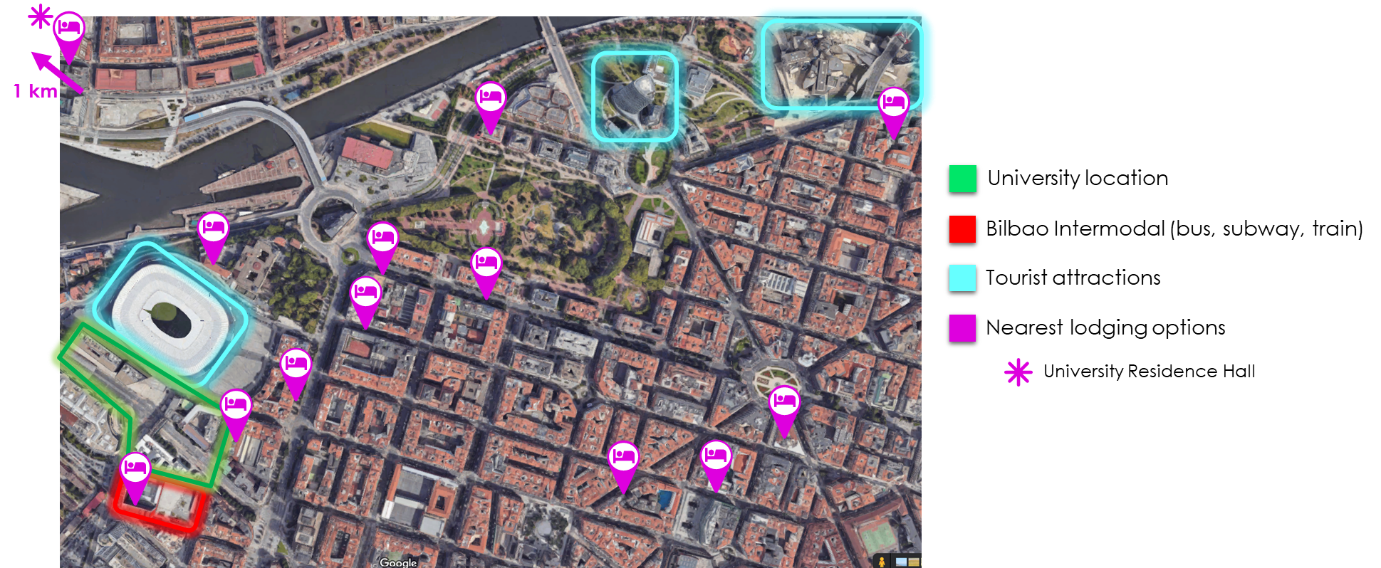International Summer School on Industrial Agents 2024: Standardization of I4.0 Systems
Welcome
It is our pleasure to invite you to participate in the 10th International Summer School on Industrial Agents: Standardization of I4.0 Systems, which will be held at the Bilbao School of Engineering, Spain, from 24th to 28th June 2024.
The International Summer School on Industrial Agents (ISSIA) is an annual international scientific event promoted by the IEEE IES Technical Committee on Industrial Agents. ISSIA has served for more than 9 editions as a meeting point to address and discuss issues about the development and application of agents and multi-agent systems in the industrial domain. ISSIA has a conference cycle format and is oriented to PhD students, postdoctoral researchers, and professionals.
General Objective of the Summer School
The summer course aims to enhance the participants‘ knowledge in the field of multi-agent systems (MAS) applied to industrial environments, particularly providing hands-on knowledge to develop industrial cyber-physical systems (e.g. production systems, smart grids, etc.) In particular, the main objectives of the course are:
- Introduce MAS principles as a suitable paradigm to develop industrial distributed collaborative systems.
- Provide practical competences in developing MAS applications for industrial automation applications.
- Deployment of agent-based solutions for industrial environments.
The participants are able to gain a range of theoretical and practical skills necessary to develop complex, real industrial agent based applications, particularly using these technologies to develop industrial cyber-physical systems.
Organizing Commitee
ISSIA 2024 is hosted by Oskar Casquero and Aintzane Armentia, members of the research group Systems Control and Integration Group of the Department of Systems Engineering and Automatic Control of the University of the Basque Country. Oskar and Aintzane have extensive experience in agent-related research. They will be the main point of contact for all summer school participants and will happily answer any questions you might have at issia2024@ehu.eus. In addition, the organization will count on the collaboration of two researchers who are doing their PhD in the group: Ekaitz Hurtado and Julen Cuadra.
Scope
The overall objective is to promote the debate about the design and development of the next generation of intelligent and sustainable production systems through industrial agents. Within this framework, ISSIA aims to serve as a point of connection between experts, researchers, and professionals working in this field, with the objective of enabling them to establish relationships that will lead to future collaborations.
The proposal for ISSIA continues with the formula already used in previous editions, which is structured around the following axes:
- An introduction to industrial agents.
- Headline topics that have a well-defined place in the summer school, e.g.: design and assessment of CPS, and design and development of field agents.
- Specific aspects that have to be addressed in the industry, where the use of industrial agents can make a relevant contribution.
- Multi-agent programming.
- (In)formal exchange between lecturers and participants.
Regarding the specific aspects, this edition will focus on the Standardization of I4.0 Systems, specifically:
- The standardized ways of interfacing assets with industrial agents to create I4.0 Components, contributing to the generalization of the AAS concept and the deployment practices proposed in the IEEE 2660.1-2020 standard.
- The design of industrial agent execution platforms that offer the infrastructure services required to guarantee the interoperability between I4.0 Components according to the Functional View of the AAS.
- The definition of technology-independent test scenarios and metrics to standardize criteria when comparing industrial agent execution platforms.
Objectives
The objectives of ISSIA 2024 are aligned with the goals of "SDG 9: Industry, Innovation and Infrastructure” to promote sustainable industrialization, in which technological progress (represented, in this case, by industrial agents and the standardization of I4.0 systems) is a key factor for the optimization of both production and resources themselves. In this context, ISSIA 2024 is organized around the following objectives:
- To introduce agent technology as a suitable paradigm to develop resilient manufacturing systems that allow achieving zero-defect production.
- To provide best practice guidelines to advance in the application of standards that ensure interoperability in I4.0, resulting in an environment conducive to the inclusion of SMEs.
- To make known the technological solutions used by companies and research centers of the environment to develop products that represent the state of the art of I4.0 systems.
- To present the technological solutions used by local companies to develop products that represent the state of the art in the control of electrical networks.
- To showcase digital transformation projects of local manufacturing industries in which digitalization and sustainability aspects are combined.
Schedule
Regular keynotes. Monday through Wednesday mornings will be devoted to sessions related to introduction to industrial agents, design and assessment of CPS, and design and development of field agents. Monday and Tuesday afternoons will be devoted to AAS programming using SPADE agent platform and including aspects from IEEE 2660.1-2020. Friday morning is devoted to open topics related to (industrial) agents.
Pitch presentations of PhD participants. Monday afternoon will be also used for pitch presentations of PhD participants.
Industry keynotes. On Wednesday afternoon, there will be industry keynotes from Vidrala (the third largest producer of glass containers for food and beverage products in Europe) and Ingeteam (specialized in energy conversion with ~4000 workers and activity structured around R&D). They will talk about digitization processes at plant and business level, and about the design and development of flexible applications for electrical protection and control equipment.
Research keynotes. On Thursday morning we will have research keynotes by staff from nearby technology and research centers: Centro Tecnológico CTC and Tekniker. These sessions will focus on the design and development of I4.0 components and platforms based on industrial agents.
Industry visit. On Thursday afternoon we will visit SMARTPM company where they will present their MIC intelligent automation platform and their Factory Lab, which perfectly fit with the topic of the summer school. The MIC platform is a state-of-the-art orchestrator of autonomous manufacturing processes, whereas the Factory Lab exemplifies a CPPS demonstrator in which different real manufacturing, control, and robotics equipment is integrated.
Social activities. A guided tour of Bilbao will take place on Wednesday evening, and a joint dinner on Thursday evening.
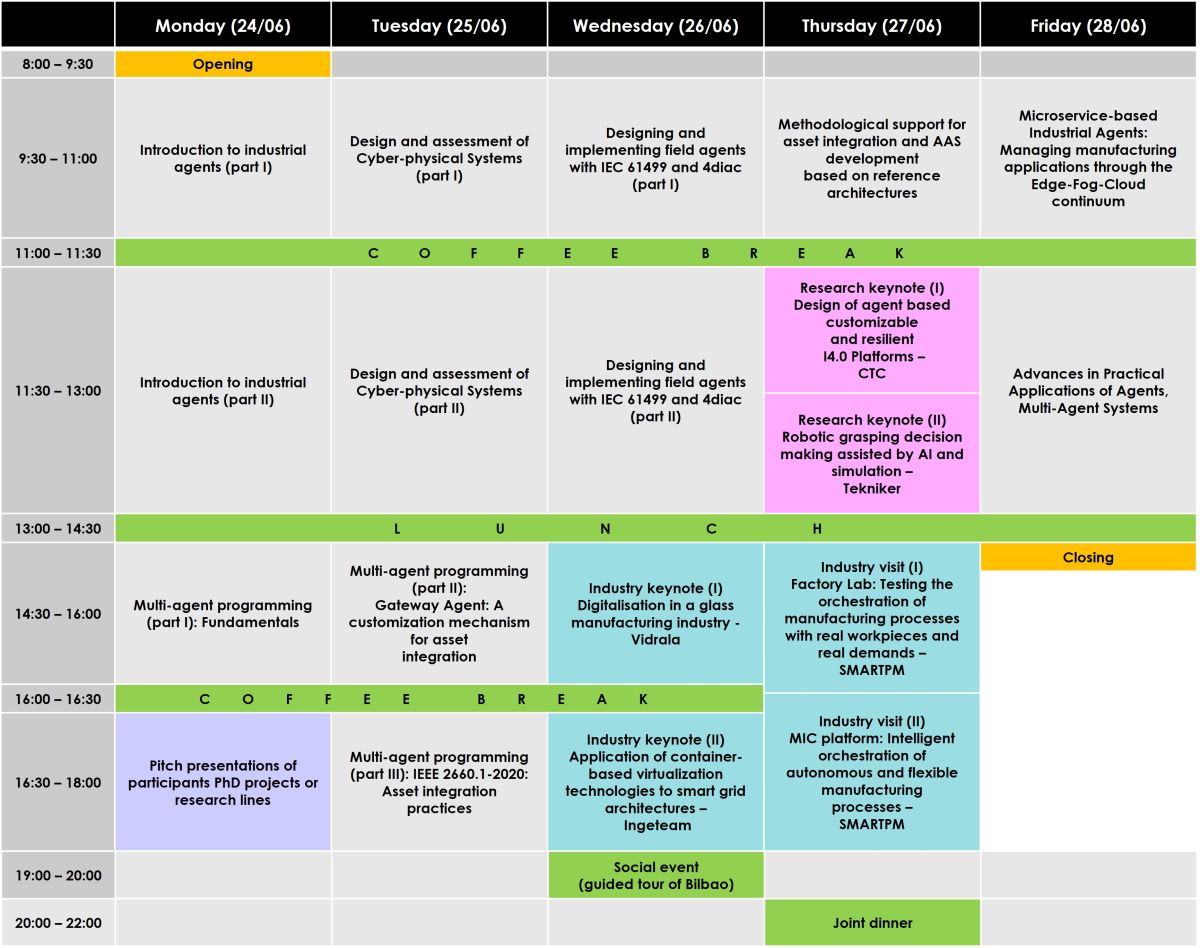
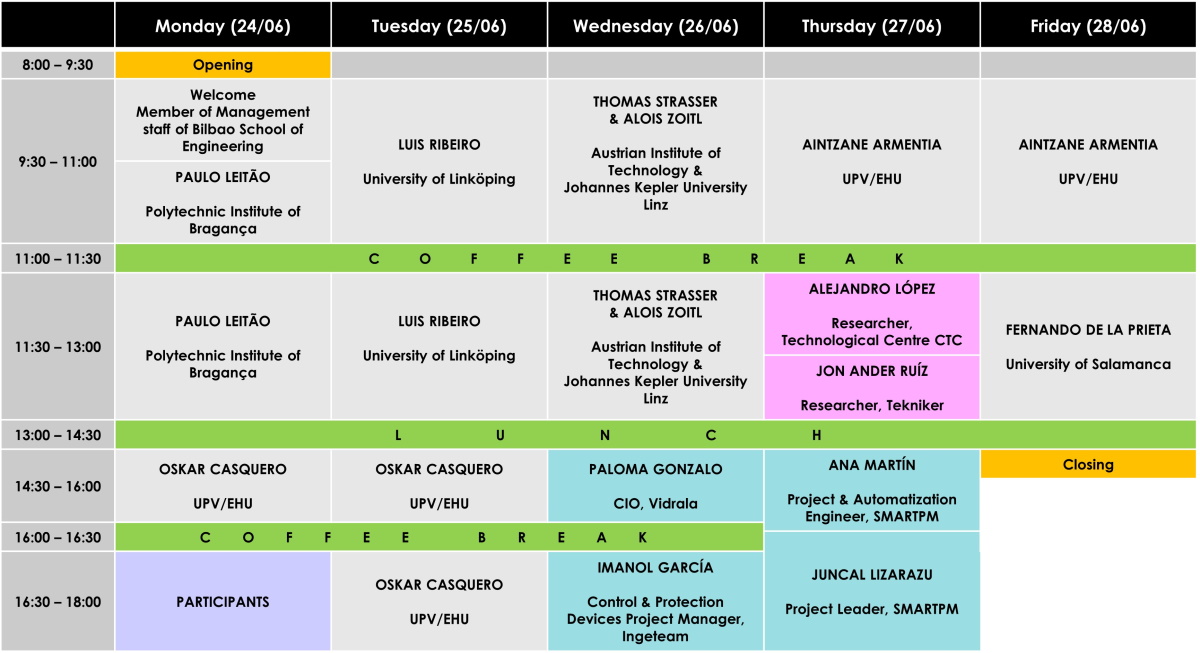
Speakers
| Lecturer | Keynote title | Center |
|---|---|---|
| Paulo Leitão | Introduction to industrial agents | Polytechnic Institute of Bragança |
| Oskar Casquero | Multi-agent programming | University of the Basque Country |
| Luis Ribeiro | Design and assessment of Cyber-Physical Systems | University of Linköping |
| Thomas Strasser | Designing and implementing field agents with IEC 61499 and 4diac | Austrian Institute of Technology |
| Alois Zoitl | Designing and implementing field agents with IEC 61499 and 4diac | Johannes Kepler University Linz |
| Paloma Gonzalo | Digitalization in a glass manufacturing industry | Vidrala |
| Imanol García | Application of container-based virtualization technologies to smart grid architectures | Ingeteam |
| Aintzane Armentia | Methodological support for asset integration and AAS development based on reference architectures | University of the Basque Country |
| Alejandro López | Design of agent-based customizable and resilient I4.0 Platforms | Technological Centre CTC |
| Jon Ander Ruíz | Robotic grasping decision making assisted by AI and simulation | Tekniker |
| Ana Martín | Factory Lab: Testing the orchestration of manufacturing processes with real workpieces and real demands | SMARTPM |
| Juncal Lizarazu | MIC platform: Intelligent orchestration of autonomous and flexible manufacturing processes | SMARTPM |
|
Fernando de la Prieta (not confirmed) |
Advances in Practical Applications of Agents, Multi-Agent Systems | University of Salamanca |
Registration
Registration fees (accommodation is not included):
- Early registration fee: 275 EUR (before 20th May 2024)
- Regular registration fee: 325 EUR
- Discounted registration fee: 175 EUR (for the second participant from the same institution)
Registration fee Produktion2030 Graduate School member (affiliation with a Swedish University): 0 EUR (indicate that you are a member in the registration e-mail).
Application: please send an e-mail to issia2024@ehu.eus with the following information:
- Full name
- Affiliation
- Current position
- Background related to industrial agents
- Billing address
Location, access, and lodging information
ISSIA 2024 is held at the Faculty of Engineering in Bilbao within the University of the Basque Country.
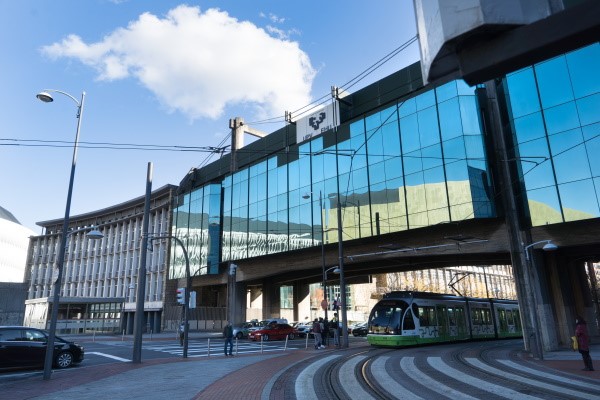

The Faculty of Engineering in Bilbao is placed in an excellent location, next to the intermodal station of Bilbao, having connections with bus, subway, train and tram lines: https://maps.app.goo.gl/nWRGUjR4a3gnV1cNA.
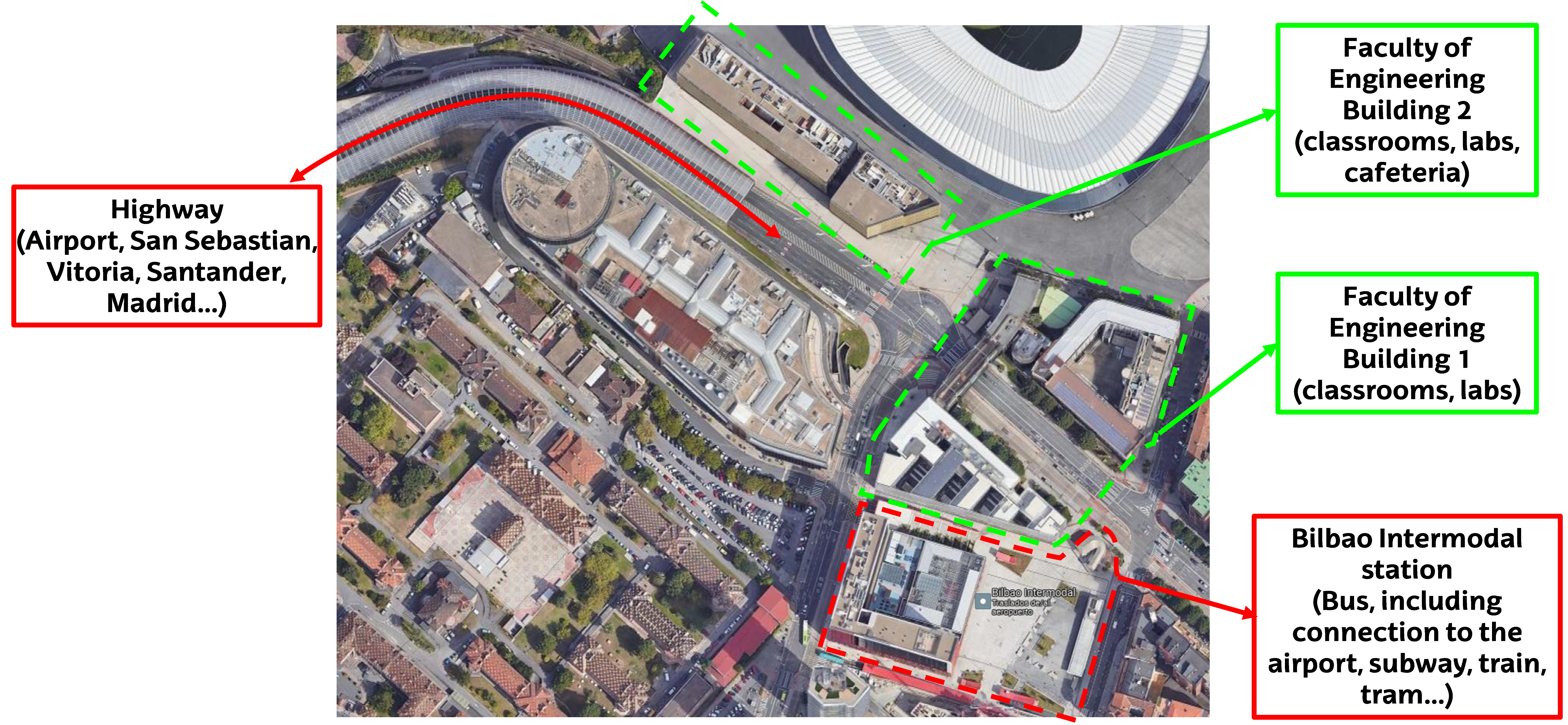
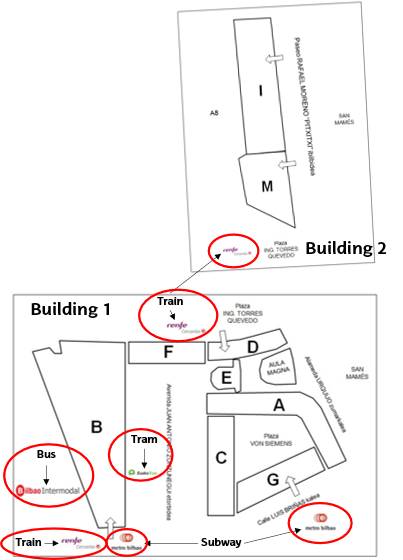
Bilbao airport, with direct connections to several major European cities, is located just 20 km from the city center, and has a direct connection to the intermodal station by means of buses departing every 15/20 minutes, depending on the time of day, at a cost of 3 EUR (line A3247, https://www.aena.es/en/bilbao/getting-there/bus.html). The intermodal station is the last stop in this line. The trip usually takes between 15 and 20 minutes, depending on traffic. Another option is taking a cab, with an approximate cost of 30 EUR to the intermodal station (https://www.aena.es/en/bilbao/getting-there/taxi.html).
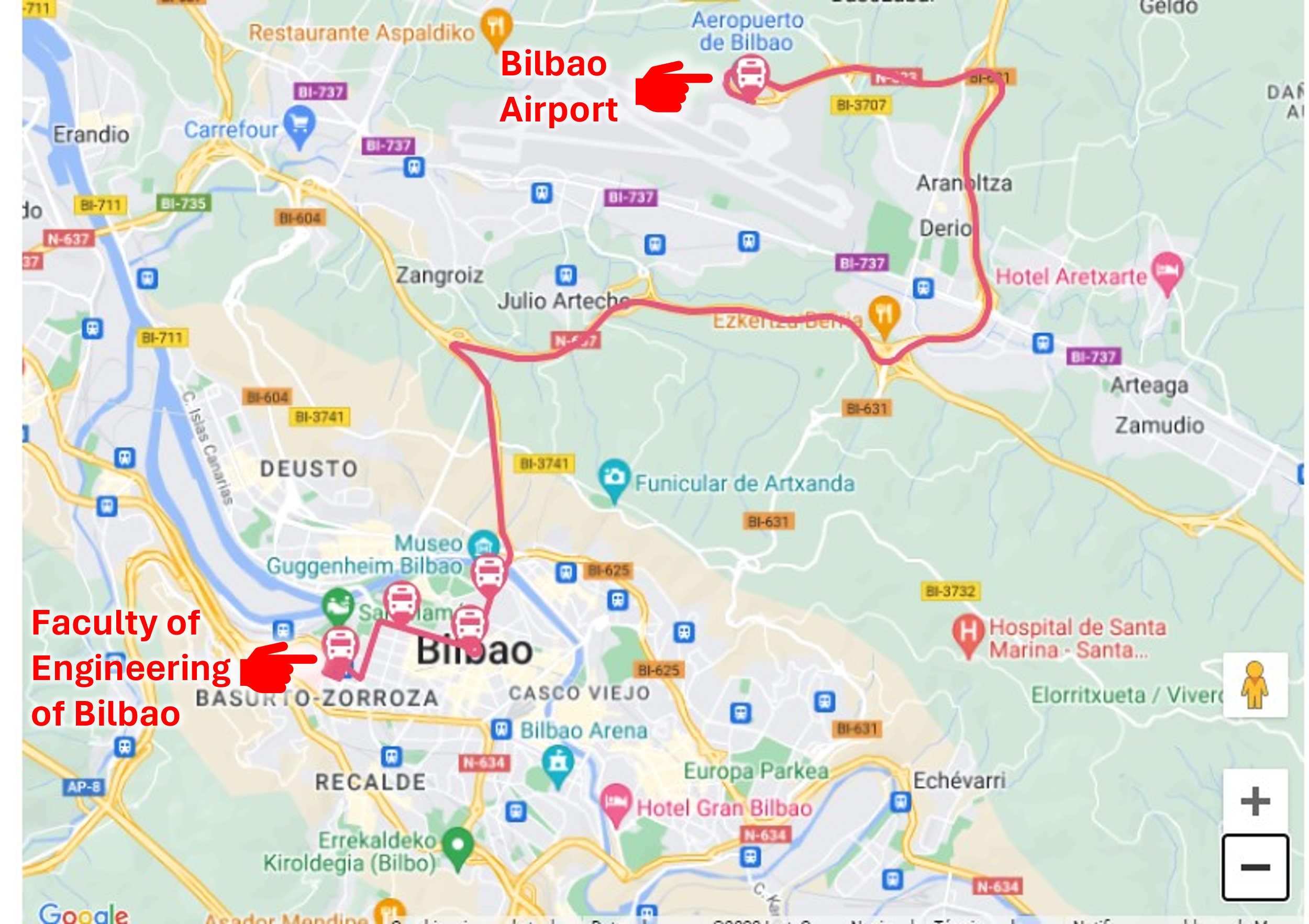
In case of not having good connections with Bilbao, other airports such as Donostia-San Sebastian, Vitoria-Gasteiz and Santander are at a maximum distance of two and a half hours by public transport from the Bilbao intermodal station.
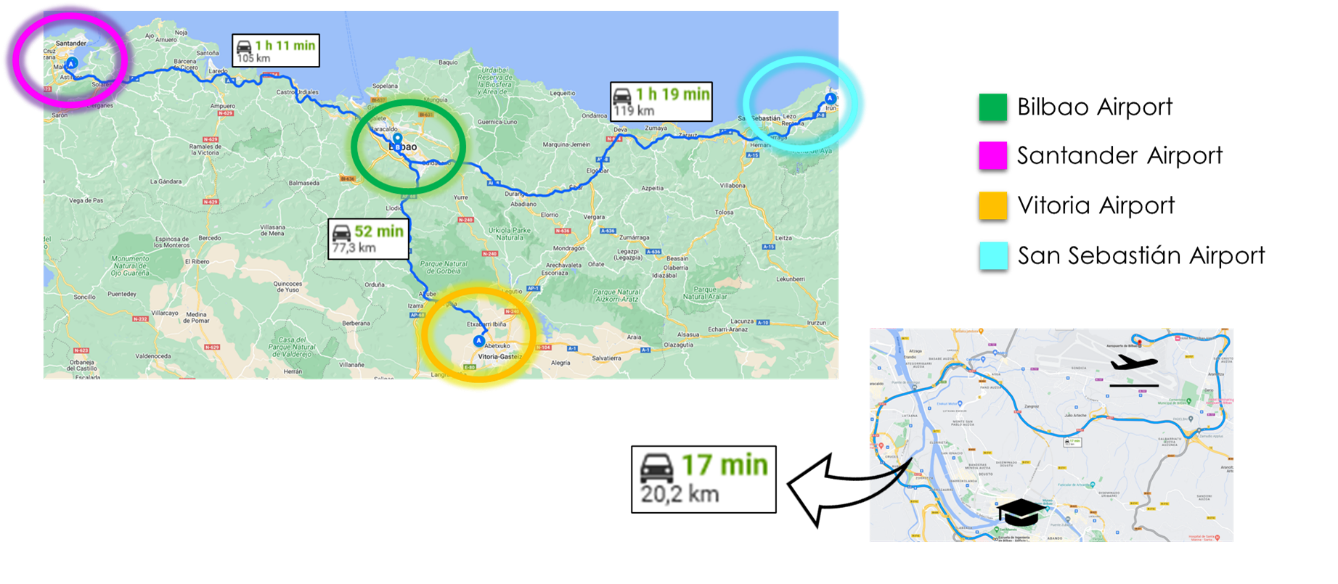
Finally, there is the option of traveling to Madrid and from there to Bilbao by plane (approximately 1 hour), public transport (between 4 and 6 hours depending on whether you travel by bus or train) or car (approximately 4 hours).
As for lodging options, the area where the Faculty of Engineering in Bilbao is located has a wide variety of hotels, tourist accommodation and bed & breakfasts. In any case, the connection with the C1 and C2 train lines, 1 and 2 subway lines and streetcar lines allows extending the search for accommodation to practically the whole city.
